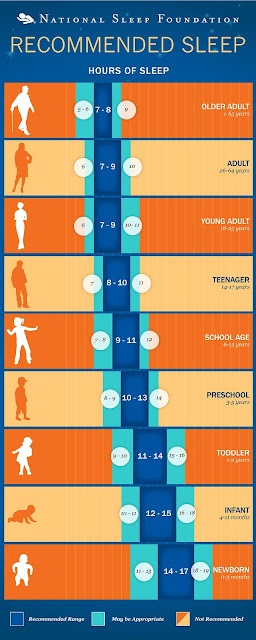Getting those ZZZZZ's
There’s something I’ve been wondering about for a while, so
I must ask: how many of you find yourselves waking up in the middle of the
night (or in my case around 2 or 3 am) with your head spinning with all the
things you need to get done the next day?
This always seems to happen when I need sleep most, which is
when I have a huge number of things on my plate. My brain tries to solve all my
problems and make me feel as though I need to start my day at 2am just to get
it all done. The trouble is, experience tells me that I am much more
productive, happy, and creative when I get a full night of sleep. So, I’ve gone
on a little quest to find out more about how to get the rest I so desperately
need, and why it matters.
The Consensus Statement of the American Academy of Sleep
Medicine and Sleep Research Society says:
“Sleeping less than 7 hours per
night on a regular basis is associated with adverse health outcomes, including weight gain and obesity, diabetes,
hypertension, heart disease and stroke, depression, and increased risk of death.
Sleeping less than 7 hours per night is also associated with impaired immune function, increased pain,
impaired performance, increased errors, and greater risk of accidents.”
 |
·
I don’t know about you, but that’s enough reason for me! Check
out the tips below and see if any of them apply to you, and remember, practice
makes perfect!
o
Keep it
constant: Research shows that a consistent sleep schedule is one of the
best methods you can use to improve your sleep, which includes weekends. So,
take time to wind down and dim the lights before bed, then expose yourself to
light after you get up in the morning to signal to your brain that it’s time to
get moving. To avoid blue light, remove electronics or utilize a blue-light
reducing features such as f.lux or Night Shift.
o
Pre-sleep
routine: A few hours before bed is when you should start to slow down. This
means avoid large meals, lower the lights, let go of your to do list, and do
relaxing activities like reading, stretching, listening to music, or take a
bath. Even 10 minutes of relaxation before bed can help. Plus, avoid vigorous
exercise and bright lights right before bed. If you read before bed, use a
light that isn’t so bright, closer to 15 watts.
o
Avoid
temptations: Use an alarm clock instead of your phone if you find yourself
scrolling through it at night. If you still find yourself glancing at the time
at night feel free to turn the clock to face the other direction so you can’t
see it easily. If your to-do list is keeping you up, keep a notepad by your bed
to get it off your mind.
o
Give your
bedroom a purpose: sleep and sex. Work, internet surfing, and TV should be
outlawed. Consider getting a more comfortable mattress, sheets, pillows, and
maintain a cool temperature to make your bedroom into the sleep sanctuary it is
meant to be.
o
Man’s
best friend: If you have a pet sleeping in bed and it disturbs your sleep
or triggers allergies, it may be time for them to sleep in their own bed.
Contact a trainer for ideas to help train your pet to sleep in its own bed.
o
Liquid
troubles: It turns out that alcohol interferes with deep sleep, although it
may make you feel sleepy initially. So, for a sound and restful night of sleep,
limit your alcohol intake.
o
Waking in
the night: If noises wake you, consider using a white noise machine, a fan,
air conditioning, or other noise-reducing options. If you find yourself waking
up for any reason and struggling to get back to sleep, the best advice is to go
to another room and do a relaxing activity until you feel tired again, rather
than remaining frustrated in bed.
o
Double
edged sword: During the day, keep naps to 20 minutes or less if they help
you get through the day. Longer naps can interfere with your natural rhythm and
make it difficult to fall asleep at night.
o
Get techy:
If you want to try out some fun tech savvy methods, NBC has compiled a great
list of options which can be found here.
It’s been difficult to stick to a consistent sleep schedule,
especially on weekends, but the more I’ve focused on it the easier it has
become. In all this, one of the methods I’ve found most helpful is to keep a
pad of paper and pen by my bed so any time something pops into my brain, I can
write it down (without even having to turn on a light!) and let go of it until
morning. Plus, one of my goals this year was to do more reading, and the short
10 to 30 minutes I’ve started reading before bed has made a remarkable
difference. Happy sleeping!
Resources:
·
Consensus Conference Panel; Recommended Amount
of Sleep for a Healthy Adult: A Joint Consensus Statement of the American
Academy of Sleep Medicine and Sleep Research Society, Sleep, Volume
38, Issue 6, 1 June 2015, Pages 843–844, https://doi-org.proxybz.lib.montana.edu:3443/10.5665/sleep.4716
·
National sleep foundation's sleep time duration
recommendations: Methodology and results summary. Hirshkowitz M., Whiton K.,
Albert S.M., Alessi C., Bruni O., DonCarlos L., Hazen N., (...), Adams Hillard
P.J. (2015) Sleep Health, 1 (1)
, pp. 40-43. http://www.sleephealthjournal.org/article/S2352-7218(15)00015-7/abstract
·
14 Smart Products to Help You Fall Asleep Faster:
NBC News. https://www.nbcnews.com/better/wellness/14-smart-products-help-you-fall-asleep-faster-n765111
·
Healthy Sleep Tips: National Sleep Foundation. https://sleepfoundation.org/sleep-tools-tips/healthy-sleep-tips
·
Twelve Simple Tips to Improve Your Sleep:
Division of Sleep Medicine at Harvard Medical School. Reviewed on December 18,
2007 http://healthysleep.med.harvard.edu/healthy/getting/overcoming/tips


Comments
Post a Comment